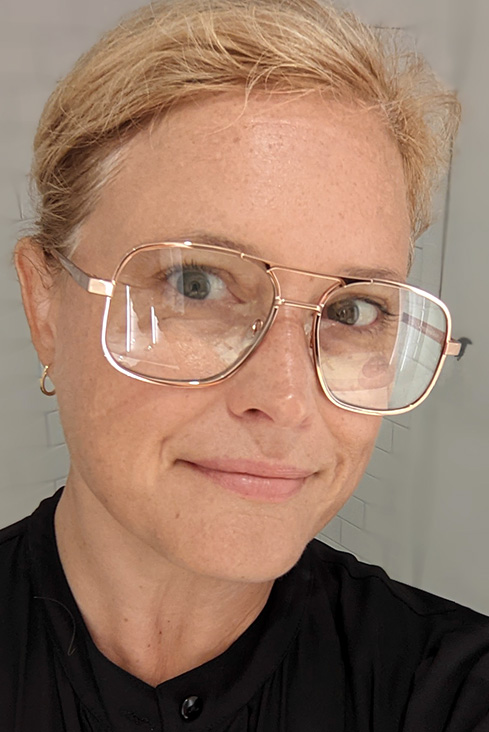/ Most Commented
Exploring Common Ground: Human Rights at ICANN
 Our relationship to human rights is ambivalent. We take them for granted, we don't want to be without them, but on the other hand, we see them as somewhat abstract and aspirational, a lofty ideal easily forgotten and set aside in our daily struggles. When it comes to the digital domain, human rights are seen by many as an unwanted source of regulations in an industry that demands "unregulated innovation." more
Our relationship to human rights is ambivalent. We take them for granted, we don't want to be without them, but on the other hand, we see them as somewhat abstract and aspirational, a lofty ideal easily forgotten and set aside in our daily struggles. When it comes to the digital domain, human rights are seen by many as an unwanted source of regulations in an industry that demands "unregulated innovation." more
- Klaus Stoll
- Comments: 0
- Views: 4,374
RIPE 86 Bites: Encryption and Active Network Management
 Change is hard, and the larger the system, the slower the pace of change. There are just so many systems that need to change their behaviors, and the motivations of users, vendors, service providers, content generators and many others all vary. Getting all of us to change some aspect of our technology, platform or application set is hard, if not impossible, to orchestrate such that it happens at the same time. more
Change is hard, and the larger the system, the slower the pace of change. There are just so many systems that need to change their behaviors, and the motivations of users, vendors, service providers, content generators and many others all vary. Getting all of us to change some aspect of our technology, platform or application set is hard, if not impossible, to orchestrate such that it happens at the same time. more
- Geoff Huston
- Comments: 0
- Views: 5,971
12th Registration Operations Workshop: Join Us Online on June 20th, 2023
 The Registration Operations Workshop (ROW) was conceived as an informal industry conference that would provide a forum for discussion of the technical aspects of registration operations in the domain name system and IP addressing. The ROW series is being co-sponsored by Verisign and ICANN and organized by Cofomo, and we are looking forward to an engaging set of talks, panel discussions, and conversations with individuals involved with the operation of domain name registrations systems. more
The Registration Operations Workshop (ROW) was conceived as an informal industry conference that would provide a forum for discussion of the technical aspects of registration operations in the domain name system and IP addressing. The ROW series is being co-sponsored by Verisign and ICANN and organized by Cofomo, and we are looking forward to an engaging set of talks, panel discussions, and conversations with individuals involved with the operation of domain name registrations systems. more
- Nicoleta Munteanu
- Comments: 0
- Views: 37,492
RIPE 86 Bites: What’s the Time?
 A little appreciated aspect of our digital infrastructure is just how dependent we are on access to time. Disrupting the time base can not only lead to disruption in communications but can result in various forms of compromise of the integrity of communications. Accurate time was all but unobtainable for centuries, and then, as we spent significant sums devising even more accurate timekeeping instruments, accurate time became a specialized service. more
A little appreciated aspect of our digital infrastructure is just how dependent we are on access to time. Disrupting the time base can not only lead to disruption in communications but can result in various forms of compromise of the integrity of communications. Accurate time was all but unobtainable for centuries, and then, as we spent significant sums devising even more accurate timekeeping instruments, accurate time became a specialized service. more
- Geoff Huston
- Comments: 0
- Views: 5,572
AI, Human Rights and the Rise of the Global South
 As the current global geopolitical space becomes less friendly to Human Rights1, are there potential offsetting trends supporting them? Yes, but... it will require initiatives from the Global South for AI data-driven policies supportive of the UN's Sustainable Development Goals (SDGs), demonstrating the value of SDGs and Human Rights combined. more
As the current global geopolitical space becomes less friendly to Human Rights1, are there potential offsetting trends supporting them? Yes, but... it will require initiatives from the Global South for AI data-driven policies supportive of the UN's Sustainable Development Goals (SDGs), demonstrating the value of SDGs and Human Rights combined. more
- Richard Taylor
- Comments: 0
- Views: 6,006
Gigabyte Motherboard Firmware Exposes Millions of PCs to Potential Cybersecurity Threats
In a potentially damaging cybersecurity revelation, researchers from the cybersecurity company Eclypsium have identified a hidden mechanism in the firmware of motherboards manufactured by Taiwanese company Gigabyte. more
- CircleID Reporter
- Comments: 0
- Views: 8,476
RIPE 86 Bites: Gigabits for EU
 Rudolph van der Berg presented on the latest updates from the ongoing tensions in the Internet industry between carriage infrastructure providers and content providers, with a European perspective. The carriage providers in the EU region are asserting that they're making major capital investments in augmenting the access network infrastructure to carry gigabit traffic volumes, which is largely streaming content, while at the same time the content providers were getting a free ride, or so goes the argument. more
Rudolph van der Berg presented on the latest updates from the ongoing tensions in the Internet industry between carriage infrastructure providers and content providers, with a European perspective. The carriage providers in the EU region are asserting that they're making major capital investments in augmenting the access network infrastructure to carry gigabit traffic volumes, which is largely streaming content, while at the same time the content providers were getting a free ride, or so goes the argument. more
- Geoff Huston
- Comments: 0
- Views: 7,047
EFF Raises Concerns Over EU’s Proposed Cyber Resilience Act
The Electronic Frontier Foundation (EFF) has voiced concerns about the European Union's proposed Cyber Resilience Act (CRA), saying it could pose significant threats to open-source developers and cybersecurity. more
- CircleID Reporter
- Comments: 0
- Views: 8,959
FCC Touts 6G
 The U.S. Federal Communications Commission (FCC) has seemingly joined forces with the marketing arm of the cellular industry in declaring that the spectrum between 7-16 GHz is now considered to be 6G. Chairman Jessica Rosenworcel recently announced that the agency would soon begin looking at the uses for this spectrum for mobile broadband. more
The U.S. Federal Communications Commission (FCC) has seemingly joined forces with the marketing arm of the cellular industry in declaring that the spectrum between 7-16 GHz is now considered to be 6G. Chairman Jessica Rosenworcel recently announced that the agency would soon begin looking at the uses for this spectrum for mobile broadband. more
- Doug Dawson
- Comments: 0
- Views: 6,597
Meta Lawsuit Leads to Significant Decline in Phishing Domains Tied to Freenom
A lawsuit filed by Meta has led to a significant decrease in phishing websites tied to the domain name registrar Freenom. Cybersecurity expert Brian Krebs in a report on Friday said that Freenom, which provides free domain name registration services, was a favored resource for cybercriminals due to its policy of protecting customer identities. more
- CircleID Reporter
- Comments: 0
- Views: 11,797
CIRA Calls for Experienced Professionals to Join Its Board
The Canadian Internet Registration Authority (CIRA) is inviting experienced professionals to join its board and help guide the organization. more
- CircleID Reporter
- Comments: 0
- Views: 33,738
The ‘Millennium Problems’ in Brand Protection
 As the brand protection industry approaches a quarter of a century in age, following the founding of pioneers Envisional and MarkMonitor in 1999, I present an overview of some of the main outstanding issues which are frequently unaddressed or are generally only partially solved by brand protection service providers. I term these the 'Millennium Problems' in reference to the set of unsolved mathematical problems published in 2000 by the Clay Mathematics Institute, and for which significant prizes were offered for solutions. more
As the brand protection industry approaches a quarter of a century in age, following the founding of pioneers Envisional and MarkMonitor in 1999, I present an overview of some of the main outstanding issues which are frequently unaddressed or are generally only partially solved by brand protection service providers. I term these the 'Millennium Problems' in reference to the set of unsolved mathematical problems published in 2000 by the Clay Mathematics Institute, and for which significant prizes were offered for solutions. more
- David Barnett
- Comments: 0
- Views: 20,949
Starlink’s New Business Broadband
 Starlink has quietly updated its business broadband offerings. The original plan for businesses was $500 per month with a two-terabyte data cap. If a customer exceeded the data cap, the speed reduced to 1 Mbps for the remainder of the month unless a customer bought additional broadband at $1 per gigabyte. Starlink business comes with a premium antenna from HP at a one-time cost of $2,500. more
Starlink has quietly updated its business broadband offerings. The original plan for businesses was $500 per month with a two-terabyte data cap. If a customer exceeded the data cap, the speed reduced to 1 Mbps for the remainder of the month unless a customer bought additional broadband at $1 per gigabyte. Starlink business comes with a premium antenna from HP at a one-time cost of $2,500. more
- Doug Dawson
- Comments: 0
- Views: 7,470
Stealth Cyberattacks by China’s Volt Typhoon Threaten U.S. Infrastructure: Microsoft Unmasks Espionage Campaign
Microsoft today disclosed the detection of covert and targeted malicious activity aimed at critical infrastructure organizations in the United States. The attack is orchestrated by a state-sponsored group from China, known as Volt Typhoon, with the suspected objective of disrupting the communication infrastructure between the U.S. and Asia during potential future crises. more
- CircleID Reporter
- Comments: 0
- Views: 8,809
RDRS: Calling All Registrars!
 Calling all registrars! ICANN is set to launch the Registration Data Request Service (RDRS), and the Registrar Stakeholder Group encourages ICANN registrars to participate. For those who haven't been closely following ICANN policy, the RDRS is a step on the path of policy development working to bring our registration data processing requirements into line with data protection laws. more
Calling all registrars! ICANN is set to launch the Registration Data Request Service (RDRS), and the Registrar Stakeholder Group encourages ICANN registrars to participate. For those who haven't been closely following ICANN policy, the RDRS is a step on the path of policy development working to bring our registration data processing requirements into line with data protection laws. more
- Ashley Heineman
- Comments: 0
- Views: 5,810